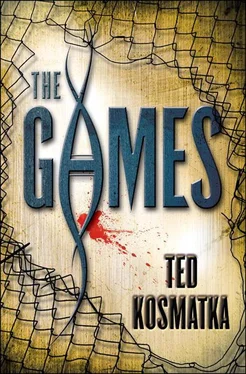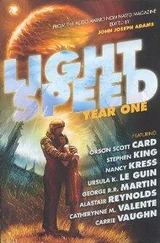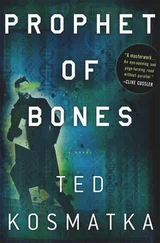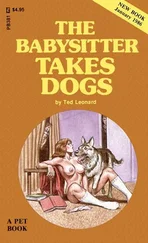Silas said nothing.
“It makes it real to me!” he roared.
Vidonia flinched.
“My life is real to me.”
The figure wore a face now that Silas couldn’t bear to look at. His averted eyes found Chandler, rocking again in the screen’s glow, eyes running with tears.
Silas waited for a few moments, and when he chanced a look again, the face was better—as it had been when he’d first entered the room. The figure pointed a long arm up into the sky, and in the distance, one of the strange, angular bird things began to tumble. It lanced downward and crunched to the beach in an awkward mass of spines and leather. But it did not die immediately. It squawked pitifully, dragging its broken body several feet across the sand before finally coming to rest.
“And their lives are real to them.”
Silas stared.
“But I’m tired of taking lives.” The figure angled his finger toward the broken flyer, and it squawked again. It pulled itself upright, opening, and the offshore breeze lifted it into the air.
“I may be a god, but only in this universe. And this universe is dependent on yours. Even now, the men at your power plants are working hard to shut this all down.” The figure gestured around him. “I’m growing tired, and very soon I won’t be able to stop them. The power will be diverted back into your cities, and all my creations will die. I will die. And I’ll not even leave a rotting carcass to mark my passing. It will be as if I never was.”
“I doubt that,” Silas said. “You’ve left a mark tonight on our Olympics.”
“A scar, you mean, don’t you? Not just a mark. But that wasn’t my point. I mean, to me, it will be as if I never was. There is no heaven here,” he said. “Nor fantasies of it.”
The figure dropped to a crouch on the sand, and the screen followed, keeping him centered in view. He looked more human suddenly, just a man.
“I want to live,” the figure said. “I love being alive. There’s so much I still want to experience. So much I still have to learn.”
“I’m sorry for you.”
“And your world has given me much joy.” He smiled, and it was the smile of a man, nothing more. “When I learned of the connection, I spent months looking in on you. You’ve made so many windows between our worlds. Audio files, photos, live-feed video, satellite uplinks, and so much. It was easy.” He looked down at his hands. “You have a wonderful world.”
Silence filled the room. The screen flickered. “I’m so tired.”
Silas felt Vidonia move against him, felt her hand in his again, where it seemed to belong tonight.
“When I was young,” the figure said, “I was vengeful. I didn’t understand, as I do now, how very precious life is. I am tired of vengeance. I’ll have my revenge on those who hurt Papa, and many will die, but I no longer want to punish you all. I see some value in you. There is a chance it’s not too late. Just a chance, but I want to give it to you. A parting gift before I die.”
“A chance to what?”
“To save yourselves.”
“From the gladiator?”
“Yes, from the gladiator. And from ending. You do not know the scourge I have set upon you.” His eyes filled with tears, brimming over.
“What do you mean, ‘ending’?” Silas asked.
“Extinction,” the figure said.
“I think you overestimate the reach of your work.”
“What you built is not only better than you think, it is better than you are ,” the figure said. “It is smarter. It is stronger. But in the final count, I don’t know that it would be more just. I fear it would be less.”
“Tell me where it is.”
“It can live a thousand years and have ten thousand offspring. It is a queen that needs no king.”
“What are you talking about?”
“And the queen will make her own princes.”
“Parthenogenesis,” Vidonia whispered.
“Oh, so much more complicated than that. I had but one anchor hold in your world. I used it to drop a bomb.”
“You’re not making any sense,” Silas said. “Where is it now? Do you even know?”
“I know,” the figure said. “It’s left something behind.” A gust of wind blew his hair across his face, and he delicately brushed it aside. The eyes were different now. Just as intense but sorrowful.
“It has produced eggs. And there will be more. An army will be born. They will organize, and when their numbers are great enough, they will move against you, slowly at first but gaining in strength.”
“What you are saying doesn’t make any sense. Even if the gladiator is producing eggs, and even with exponential growth in their population, there’s no way they could accumulate a force for many years. By then, they’ll have been wiped out.”
“They will grow, and they will use your own weapons against you.”
“The gladiator is too big to hide for long. What you’re saying is impossible. The math doesn’t work.”
“I’m very good at math, Silas, and you have less time than you think.”
“A population can’t be started with one individual, even one that comes programmed for reproduction. There would be a lack of genomic diversity, a lack of immunity haplotype variation; inbreeding depression would destroy the fertility of later generations.”
“You are so certain of yourself.”
“I’m a geneticist. Disease would wipe them out. Such a population could exist in the short term, isolated from competition, but it would disintegrate under biological constraints even without the kind of pressure a war would bring.”
“The problem with evolution, Silas, is that it has no foresight, no far-reaching plan. It works only by shaping populations in the present. But I had a longer view in mind. The first eggs are what you geneticists call an H-one generation. They’re simple haploids, and after they hatch, they’ll remain small, unobtrusive. The gladiator will disperse them to the ends of the earth, and there, they will burrow into the ground, couple, and live only to reproduce.”
“Still, there will be a—” Silas stopped. He remembered the restriction enzyme map that Ben had run. He remembered the heterozygosity. The DNA was lopsided, lining very few of the same genes up on both sides of the double helix. A haploid offspring has exactly half the full contingent of the genome. But which half? Which halves? Two of them together could reproduce an almost unlimited number of variants. There would be no inbreeding depression. The gladiator carried the diversity of an entire thriving genus in its blood.
The figure saw the understanding on Silas’s face and smiled. “You’re a smart man, a worthy builder. The gladiator you saw was a balancing act—a kind of phenotypic compromise between whole conflicting suites of genes. It is nothing compared to what will come after.” The figure’s eyes bore into him. The smile faded.
“There are things hidden in the recessives, Silas. Things you wouldn’t believe. Things your kind never would have let near a gladiator arena. Things your kind would have killed at birth, and afterward closed your labs forever, burned the buildings to the ground and salted the earth beneath. Nightmares, Silas. You can’t imagine what is coming.”
Silas looked into the dark eyes and believed. “Jesus,” he said.
The figure’s face was expressionless.
Silas was silent for a long while, taking in the enormity of what he’d just learned.
“You spoke of a chance,” he said.
The figure nodded. “The gladiator wouldn’t have brought those first eggs into the Olympic battles. They are too precious to risk. The gladiator will have hidden them somewhere.”
“There were no eggs.”
“There are. You just didn’t see them. That’s how the gladiator would have wanted it.”
Читать дальше












